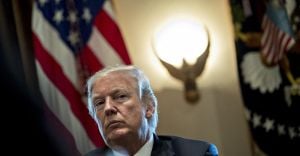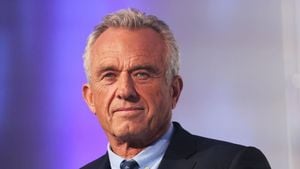Robert F. Kennedy Jr. is making waves with his bold plans for what could happen if he joins Donald Trump’s administration. His focus? Transforming the food policy, particularly by targeting processed food and unhealthy eating habits among children. At the heart of his agenda is the ambition to eliminate processed foods from school lunches, marking a significant shift from previous dietary guidelines established during earlier Republican administrations.
Just last month, Kennedy made headlines during his appearance on Fox News when he promised to take swift action on the issue. He said, “I would get processed food out of school lunches immediately” if he were to secure a role within Trump’s cabinet. This declaration has not only raised eyebrows but has also ignited discussions among nutrition experts and health advocates.
The unexpected shift in policy proposals is particularly surprising considering Trump’s first term, during which the administration rolled back many of the healthier meal standards championed by former First Lady Michelle Obama. Those efforts aimed to provide healthier meals for schoolchildren but faced fierce opposition from Trump’s agricultural secretary, Sonny Perdue, who famously declared his preference to “make school meals great again.” The perception of Kennedy’s recent stance as opposite to previous Republican dietary policies has left both supporters and critics confused.
Kennedy’s ambitious plans don’t stop at the school cafeteria. His agenda also includes addressing food dyes, which are often found in many processed snacks and drinks—something many parents have raised concerns about for years. If Kennedy gets his way, he’ll likely push for significant reforms to make food for children healthier and more nutritious.
While we’re seeing this potential partnership between Kennedy and Trump form, nutrition experts are expressing caution over these plans. They worry about how realistic his goals are and the logistics of implementing them within the complex framework of federal school nutrition policies.
Previously, the focus on removing processed foods seemed non-existent; the Trump administration had, instead, leaned toward making meals cheaper and less regulated. The sudden crossover could indicate a wider strategy to appeal to health-conscious voters, especially those from independent and moderate backgrounds. Some believe this shift could be aimed at counteracting expected challenges from the Democratic side, especially with figures like Vice President Kamala Harris watching closely.
Beyond school lunches, Kennedy has also set his eyes on eliminating fluoride from the nation’s drinking water supply, amid widespread belief among health officials who argue fluoride has played instrumental roles in dental health. The mix of controversial health agendas has stirred up debates within the community and beyond, creating varying opinions on the potential health impacts these changes might bring.
Trump himself has remained relatively ambiguous about Kennedy’s role, though he has expressed willingness to give Kennedy the freedom to explore his health initiatives. “He wants to go do some things and we’re going to let him go to it,” Trump stated, signifying some tacit approval of Kennedy’s very ambitious public health aims.
They both are placing their bets on each other, with the hope of galvanizing support from disenchanted voters turned off by traditional party politics. This strategic alliance could see them to maneuver through the political minefield leading up to the next election.
Despite the apparent synergy between Trump and Kennedy, quite how this partnership will play out on the ground level remains uncertain. With Kennedy's strong advocacy for dietary reform meeting Trump’s previously laid-back attitudes toward food policy, what kind of suggestions will come forth? Can Kennedy truly alter the food policy narrative?
The road to reforming America's food policies won't be easy. The entrenched interests of the agricultural industry and school nutrition stakeholders are always present, with their influence extending to Congress and state legislatures. Kennedy will have to navigate this political terrain carefully. If he does, he could reshape the conversation on nutrition standards for years to come—if acknowledged, of course.
Whether he’ll actually have the opportunity to make good on his promises remains to be seen. There’s still no formal confirmation of Kennedy’s role within Trump’s team, though whispers suggest he could serve as “an adviser without Senate confirmation,” allowing him to interact with the White House directly. Trump’s acknowledgment of wanting to give him leeway could indicate significant backing for Kennedy’s initiatives, if these negotiations take shape.
The food policies likely to emerge from this duo bonding could potentially be more than just food agendas; they may reflect broader attempts to display the administration’s commitment to health reforms and improved quality of life for schoolchildren across the nation. It’s one thing to make bold promises, but the real challenge will come with the implementation, which often gets bogged down by bureaucracy and conflicting interests.
While Kennedy’s proposals certainly capture public attention and may energize voters who are increasingly aware of health issues pertaining to food, time will tell if he can deliver what he’s promised. For now, the spotlight is firmly on whether he can strike the right balance between ambitious goals and the political realities inherent within the U.S. food system.
To sum it up, Kennedy's declaration has set the stage for what could become one of the more dramatic changes to U.S. food policies if he is granted the power to roll out his vision. The mixture of politics and health deeply intertwines here, raising questions about what the future of school lunches and overall food policy might hold under the next administration. It's certainly going to be interesting to watch this space!



